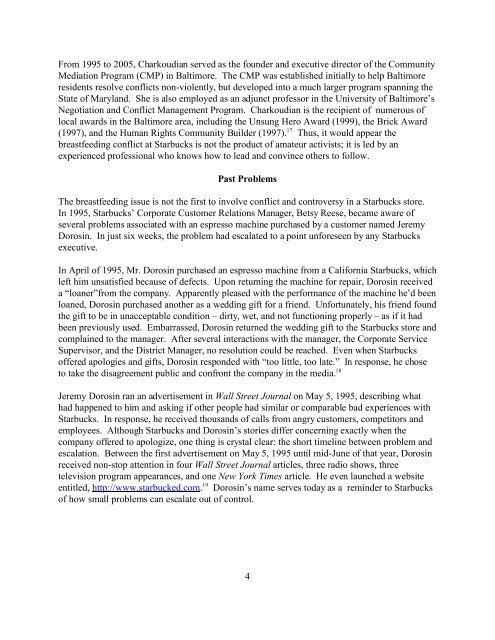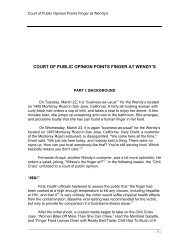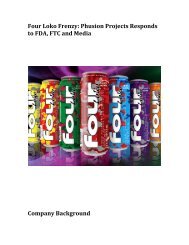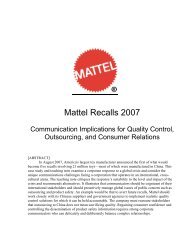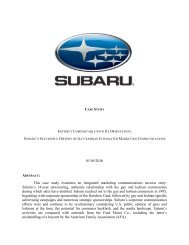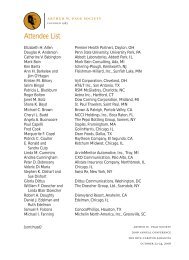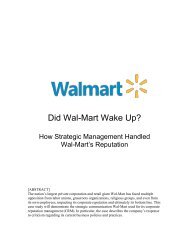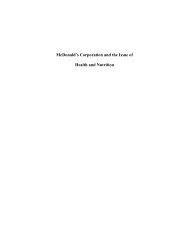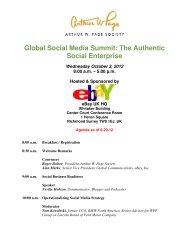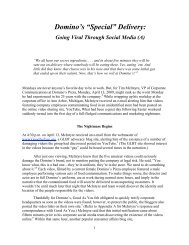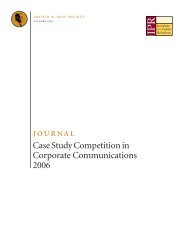Starbucks Corporation: - The Arthur Page Society
Starbucks Corporation: - The Arthur Page Society
Starbucks Corporation: - The Arthur Page Society
You also want an ePaper? Increase the reach of your titles
YUMPU automatically turns print PDFs into web optimized ePapers that Google loves.
From 1995 to 2005, Charkoudian served as the founder and executive director of the Community<br />
Mediation Program (CMP) in Baltimore. <strong>The</strong> CMP was established initially to help Baltimore<br />
residents resolve conflicts non-violently, but developed into a much larger program spanning the<br />
State of Maryland. She is also employed as an adjunct professor in the University of Baltimore’s<br />
Negotiation and Conflict Management Program. Charkoudian is the recipient of numerous of<br />
local awards in the Baltimore area, including the Unsung Hero Award (1999), the Brick Award<br />
(1997), and the Human Rights Community Builder (1997). 17 Thus, it would appear the<br />
breastfeeding conflict at <strong>Starbucks</strong> is not the product of amateur activists; it is led by an<br />
experienced professional who knows how to lead and convince others to follow.<br />
Past Problems<br />
<strong>The</strong> breastfeeding issue is not the first to involve conflict and controversy in a <strong>Starbucks</strong> store.<br />
In 1995, <strong>Starbucks</strong>’ Corporate Customer Relations Manager, Betsy Reese, became aware of<br />
several problems associated with an espresso machine purchased by a customer named Jeremy<br />
Dorosin. In just six weeks, the problem had escalated to a point unforeseen by any <strong>Starbucks</strong><br />
executive.<br />
In April of 1995, Mr. Dorosin purchased an espresso machine from a California <strong>Starbucks</strong>, which<br />
left him unsatisfied because of defects. Upon returning the machine for repair, Dorosin received<br />
a “loaner”from the company. Apparently pleased with the performance of the machine he’d been<br />
loaned, Dorosin purchased another as a wedding gift for a friend. Unfortunately, his friend found<br />
the gift to be in unacceptable condition – dirty, wet, and not functioning properly – as if it had<br />
been previously used. Embarrassed, Dorosin returned the wedding gift to the <strong>Starbucks</strong> store and<br />
complained to the manager. After several interactions with the manager, the Corporate Service<br />
Supervisor, and the District Manager, no resolution could be reached. Even when <strong>Starbucks</strong><br />
offered apologies and gifts, Dorosin responded with “too little, too late.” In response, he chose<br />
to take the disagreement public and confront the company in the media. 18<br />
Jeremy Dorosin ran an advertisement in Wall Street Journal on May 5, 1995, describing what<br />
had happened to him and asking if other people had similar or comparable bad experiences with<br />
<strong>Starbucks</strong>. In response, he received thousands of calls from angry customers, competitors and<br />
employees. Although <strong>Starbucks</strong> and Dorosin’s stories differ concerning exactly when the<br />
company offered to apologize, one thing is crystal clear: the short timeline between problem and<br />
escalation. Between the first advertisement on May 5, 1995 until mid-June of that year, Dorosin<br />
received non-stop attention in four Wall Street Journal articles, three radio shows, three<br />
television program appearances, and one New York Times article. He even launched a website<br />
entitled, http://www.starbucked.com. 19 Dorosin’s name serves today as a reminder to <strong>Starbucks</strong><br />
of how small problems can escalate out of control.<br />
4


